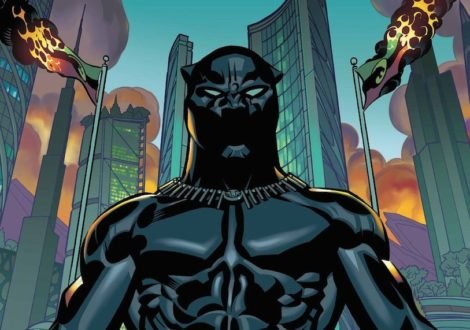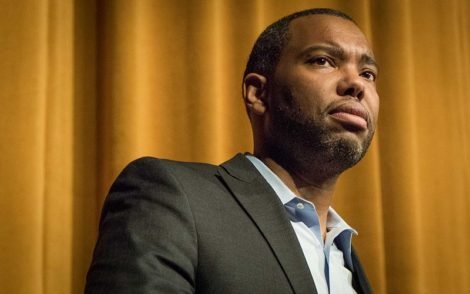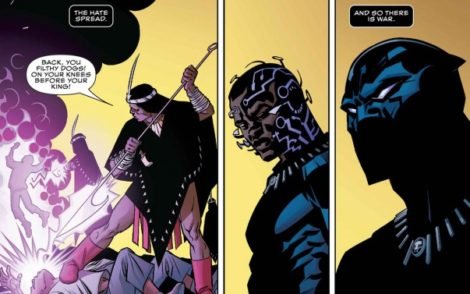In addition to writing blog posts, I'm crossposting my comic book column here from its original home. You can read the originals at sensiblereason.com. And yes, I am a verified writer! Check out my Twitter @ElyseHauser for proof.
Originally published June 9, 2016

I really, really wanted to review Civil War — the movie. I’ve seen it twice so far and I’m angling to see it a third time, although since rent was just due, no one can afford the movies right now. But I’ve also been fiercely reading all of the excellent reviews and think pieces about the movie; which are so numerous at this point that it’s hard to justify writing one of my own. Nearly everything I would say has been said, in some form, already — and said very well, for the most part.
My favorite thing about the film, by far, was Chadwick Boseman’s Black Panther. From the instant T’Challa (Black Panther’s name by day) appeared on the screen — having not yet assumed the title of King of Wakanda or of Black Panther — viewers could sense that we were in the presence of greatness. That sense of greatness has been a key trait of Black Panther ever since the character was introduced by Stan Lee in 1966. As the first black superhero in major American comics, Black Panther has had ups and downs throughout the years. But, even through the most questionable of costumes and storylines, this has always been a character who is crucial to the Marvel universe — not because of any ties he has to other characters or storylines, but because there is not, and never will be, another superhero as unique.

Chadwick Boseman as T’Challa.
Black Panther doesn’t need to hide his identity — he’s king of the most scientifically advanced nation in the Marvel Universe. He lives in the beautiful (fictional) Afrofuturist country of Wakanda and fights only when something interferes with his or Wakanda’s peace and prosperity. Unlike most popular male superheroes, women are his advisors and protectors, rather than love interests or damsels in distress. Black Panther isn’t here for petty interpersonal drama, or a girlfriend, or a superhero team, or some sort of personal moral compass. Black Panther’s here for Black Panther.
And now we have a newly revamped Black Panther, not just onscreen, but in the new Black Panther series by unlikely comic writer Ta-Nehisi Coates. Of course, the new series has also been greatly discussed and dissected. But comics always have a smaller following than the films based on them, so the discussion doesn’t feel quite so complete and there is much to talk about. Ta-Nehisi Coates is an unlikely comic writer simply because he has never written a comic before.
If his name sounds familiar, it’s because he turns out excellent writing for The Atlantic on a regular basis. Coates has written for such high-profile publications as The Village Voice and Time magazine, in addition to publishing two books. He was one of those icons who snuck up on me. Without ever intentionally looking him up, his work came across my desk so often and was of such high quality that I unconsciously catalogued his name under “writers I admire.” It’s well-deserved admiration: Coates is an immensely talented writer, covering cultural, political, and racial issues with a balance of straightforwardness and delicacy few writers manage to strike. But how does it translate into comics?

Ta-Nehisi Coates.
I confess to only having read the first issue of the new Black Panther—the second one is sold out and waiting on a second printing at both my local comic shops. I feel a twinge of guilt, because even my #1 is a second printing and not the sure-to-be-ultra-collectible first printing. That said, such a historical comic is one that I’d likely never part with no matter the selling price. For me, the value of comics is in the pages, not the resale value. And this one is definitely worth holding on to.
Coates’ first Black Panther issue has a slightly rough feel. The sense that it was written by a non-comic writer is tangible. It’s hard to pinpoint exactly where that feeling comes from, but I would guess that it’s because the expected tropes and benchmarks of a first issue aren’t in this one — yet the feeling is so subtle that I’m not even sure what those tropes and benchmarks are. Coates leads us through the story in a way that it seems other comic writers wouldn’t. Scenes change without the wide establishing shots used in many comics (which may be the decision of the artist, but likely also has something to do with the way it’s written). Characters flit in and out of the pages with little context. Most memorable is a couple in an intense prison break scene, although there is a great deal of foreshadowing. A couple of opening paragraphs before the first page gives us some backstory, but there isn’t any of the heavy-handed exposition through dialogue that we often see in Marvel books.
Although lots has to happen in a first issue in order to hold the attention of the reader, this one feels especially fast-paced, if not slightly cluttered. However, this is the first of an 11-part series, and it makes little sense to criticize the events that happen in a single issue when they are clearly setting up a much larger picture. One thing that’s always drawn me to Coates’ writing is his ability to contextualize even seemingly miniscule happenings with so much history and culture that readers will wonder how they didn’t make the connections themselves. I’m fairly confident that he will do the same with this comic series. Of course, the connections and big picture of the Marvel Universe are important, but even more important are the moments when comic books can connect to what’s happening in the real world. Few people understand politics and culture like Ta-Nehisi Coates. It seems likely that he might use that real-world knowledge to inform his new series.

What direction this might take is unclear from the events in the first book. This is very much a setting-up book, full of exciting moments and intense visuals, but without much in the way of storyline yet. A writer like Coates, however, knows how to tie complex threads together to make a story complete. Although the comic book medium is very different from the long-form journalism he’s known for, good writers are good writers no matter where you put them.
“Black Panther #1” is worth reading because it’s the first of a series that I believe is going to be indispensable reading for any serious comic reader. Number 2 awaits me as soon as the second printing hits my local shelves. No doubt some of you have already read it. But for the rest of you, get thee to a comic store and read some new Black Panther!
And while you’re waiting for the next installments, you should check out the rest of Coates’ writing, too. I admit it: I’m a fangirl.
Hi! I am a content-detection robot. I found similar content that readers might be interested in:
http://sensiblereason.com/comics-vixen-new-black-panther/
Downvoting a post can decrease pending rewards and make it less visible. Common reasons:
Submit
This bot needs fixed or white lists need to be better made.
Downvoting a post can decrease pending rewards and make it less visible. Common reasons:
Submit
I've kind of developed a weird appreciation for the bot. They're like, my top commenter! And trying so hard to do good work.
Downvoting a post can decrease pending rewards and make it less visible. Common reasons:
Submit
They should have the bot text intro "Hi!" replaced with "First Post!" lol
Downvoting a post can decrease pending rewards and make it less visible. Common reasons:
Submit
A comic book guy :)
There aren't many comicbook nerds here. Nice to meet you.
I'll be following you.
Downvoting a post can decrease pending rewards and make it less visible. Common reasons:
Submit
Nice to meet you too! Love my fellow comic book nerds.
Downvoting a post can decrease pending rewards and make it less visible. Common reasons:
Submit